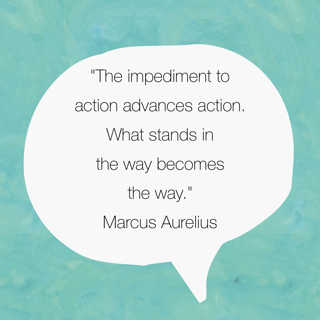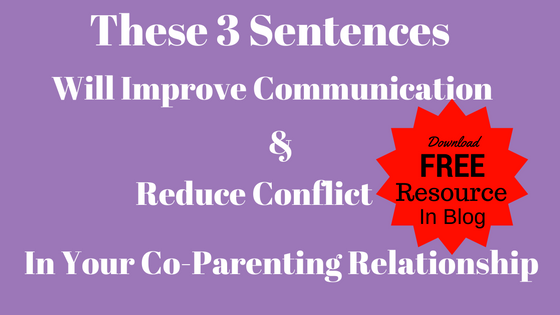|
11/20/2016 These 3 Sentences Will Improve Communication & Reduce Conflict In Your Co-Parenting RelationshipRead Now
Co-parenting after divorce can be one of the most challenging tasks parents face. The divorced couple, who likely no longer trust or respect each other are now charged with raising their children together. By the way, for the rest of thier lives. But, there is hope in the form of a 3 lined template.

Many of the parents I work with in my practice blame each other for many of the problems they are dealing with in the co-parenting relationship. They start each communication by either symbolically or literally pointing the finger at each other. When they do this, the other parent is likely to become defensive and either fight back or run away.
A major misconception by co-parents is that the louder parent or the parent who gets the last word "wins". I'm sorry to tell you that I have never seen anyone resolve conflict by arguing and calling each other names. I will also tell you that if you approach co-parenting with a "win/lose" mindset. Nobody will win and your children will lose. During these co-parenting conflicts, you are likely to find that you and the other co-parent are actually arguing about different things. Let me give you an example. Jack and Diane have difficulty agreeing on what is best for their children. Jack is yelling at Diane because she is always telling him what he should do with the kids. Jack's response is to call Diane names and tell her that she does not know anything. They are getting nowhere and quickly destroying the co-parenting relationship. As I ask each about their underlying concerns, and interests, I find out that underneath the blaming and name calling is one parent (Jack) who is upset because Diane does not trust him and thinks she views him as incompetent. Diane, who use to be a stay at home mother before the divorce, is struggling letting go of her control of the kids when they are with Jack. One parent is arguing about wanting trust/respect and the other parent is arguing about their loss of control and neither parent realizes it. Jack and Diane are not only on the wrong page, but in different books. Before I share the magical three lined template that is going to dramatically improve your communication and reduce conflict in your co-parenting relationship, I want to share an important concept. I promise, were almost there. You are going to read me talk about this concept throughout most of the blog posts I write. The reason, is this concept is one of the most important tenets to learn to improve the quality of your life, the life of your children, and yes, even the life of the other co-parent. In order to feel and behave differently in your co-parenting situation, you have to start pointing your finger at yourself and not at the other co-parent. I know most of us have been taught differently, me too. I grew up learning other people and situations are responsible for my feelings and behavior. In other words, you made me angry and if you just left me alone or the situation changed, my anger would go away and I would feel better. Guess what? When this happened, I usually felt better after a while. Thus, reinforcing my belief that it was you or the situation that made me angry. However, when I think this way, I am inadvertently: 1.) giving someone else control over my emotions. 2.) disempowering myself to change how I feel/behave. 3.) at more risk to over- or under- react to co-parenting stressors You probably have endless examples of how the other co-parent has caused your anger and drove you to acting inappropriately somehow. Before you stop reading and call me a "quack", let me explain how our emotions and behaviors really work. My thoughts/beliefs about another person or situation are what cause my feelings and behaviors, not the other way around. Ask yourself this question. How could someone else's behavior or thoughts make me feel anything? Are any of you reading this article being impacted by what I am thinking right now? Think of it another way. If situations caused our feelings/behavior, then we would all feel and act the same way in response to similar situations, and we know that is not true. Why? Because we think differently about situations and or people, thus impacting our emotions and behaviors differently. If you held in there, thank you. I will now reward you with the magical three lined template that is going to dramatically improve your communication and reduce conflict in your co-parenting relationship. THE "I " STATEMENT 1.) I Feel ______________. (Your Emotion). 2.) When (you) __________________ (Behavior or Situation-Described Objectively) 3.) Because I Think ___________. (Your thoughts/belief about their behavior or situation). After, you share your I statement, you could always add: What I Would Like You To Do Next Time Is ___________________________.
Some reasons "I" statements work so well to reduce conflict & improve communication.
First, using "I" is sharing with the other parent that this is your belief, not a fact. Second, it keeps us from blaming each other and increases the likelihood the other parent will actually hear what you are saying. You are pointing the finger back at you and not at them. At no time are you blaming them or saying you know why they did or didn't do something. Third, it puts our thoughts, feelings, and behaviors in the correct order. How you feel when the other parent does or doesn't do something is caused by what you think of that behavior, not the behavior itself. Activity: Download your free "I Statement" Template to practice identifying, correcting, and replacing irrational thoughts that are causing problems in your co-parenting relationship. Then: 1.) Identify what you want to share with the other co-parent. 2.) Fill in the "I" statement template. (TIP: you want to write the When you ____ section, so that you and the other co-parent would agree. For example, you wouldn't write "when you were being a jerk" you would write "when you arrived at 2 pm instead of 1 pm"). 3.) Practice saying the "I' statement by yourself or with someone you trust before sharing with the other co-parent. 4.) After sharing the new "I" statement with the other co-parent, stop and listen. 5.) If appropriate, offer What you would like them to do next . A final thought. When deciding to share with the other co-parent, you may find yourself influenced by what you think he/she will do, say, or think about what you shared with them. Ideally, you want a positive response to an "I" statement, but if not don't be discouraged. You are still interacting in a healthier manner, avoiding conflict, and modeling behavior that may positively influence the behavior of the other co-parent. I want this blog to be relevant to the co-parents that read it. I don't want to be another blog that tells you what you should or shouldn't do in the co-parenting relationship. I want to know your pains, fears, and frustrations as a co-parent, so I can provide content that will help you. Therefore, I would love to hear your comments and suggestions for future blog posts/resources. If you would rather contact me directly, I can be reached at [email protected]. Best Wishes,
7 Comments
Kelly Vick
11/21/2016 08:50:37 am
Great read! I found myself in "Diane's shoes" became she I Am a stay at home mom I struggle when others discipline my kids because I feel like I've lost control
Reply
Robin Ramundo
12/6/2016 05:40:00 pm
Hi Dr. Vick this was a great piece to read. As a child of divorce and as a divorcee myself I understand all the challenges and faced many of them. I feel that when you are going through a divorce it's not a nice road to begin with, there is alot of hurt and alot of anger one parents attorney arguing it out with the other parents attorney. I don't think we as parents realize how detrimental the effects are on our children. I've noticed in my own personal divorce that I was not purposely stating things to my child directly, it was more indirect. Whether I'd be talking to my attorney or a family member I didn't even realize my daughter could over hear everything and it made me feel like a failure and that is when I learned to positively discuss our divorce and let her know she could talk to me about it as well if she had any questions. My ex-husband and I have come along way since I left NY and we are able to finally Co parent our child in a healthy, positive way. I was fortunate enough to recognize all of this by working for you and having that little bit of knowledge has saved my daughter. I really enjoyed this article. Take care. Hope all is well.
Reply
Dr. Vick
12/12/2016 06:14:15 am
Thanks Robin. I'm so glad to hear that. It's never too late to repair relationships. It was nice to hear from you. I hope all is well. Merry Christmas.
Reply
12/20/2021 05:57:41 pm
Thanks for pointing out that co-parenting after divorce can be one of the most challenging tasks parents face. This is helpful because my brother will be filing for divorce next month. He and his wife are hoping to find an expert who can guide them with co-parenting for their five kids.
Reply
There is recuperating in telling. There is recuperating in uncovering misuse. Recuperating in is being honest. There is recuperating in realizing you are not to fault. There is recuperating in supporting yourself. There is recuperating in defining limits. There is recuperating in confidence. Clutch trust that you will recuperate.
Reply
There is recuperating in telling. There is recuperating in uncovering misuse. Recuperating in is being honest. There is recuperating in realizing you are not to fault. There is recuperating in supporting yourself. There is recuperating in defining limits. There is recuperating in confidence. Clutch trust that you will recuperate.
Reply
Leave a Reply. |
Details
AuthorDr. Garin D. Vick Archives
August 2018
Categories |





 RSS Feed
RSS Feed